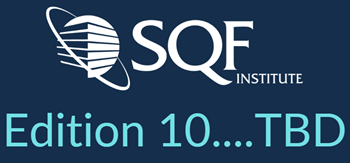By LeAnn Chuboff, Vice President, Technical Affairs, SQFI

The development of SQF Edition 9, like the development of many standards, followed a systematic and collaborative process. The development of each edition involves input from industry experts, stakeholders, and professionals in food safety.
As more than 700 food safety professionals prepare to gather at SQF Unites, March 11 – 14, 2024 in New Orleans, we know that industry feedback plays a pivotal role in the development of a new SQF edition.
The input and insights gathered from various stakeholders within the food industry are essential for several reasons: real-world insights, identification of gaps, practical implementation considerations, global perspectives, feedback on risk assessments, and opportunities for continuous improvements.
The need for a new edition of the Safe Quality Food (SQF) standard is typically driven by various factors that may include changes in the industry landscape, advancements in food safety science, regulatory updates, data analysis, and feedback from stakeholders. Common factors that could constitute a need for a new SQF edition include industry feedback, emerging food safety issues, changing global supply chains, global events and crises, regulatory changes, evolving scientific understanding of food safety risks and best practices, or improved alignment with global standards and programs.
It's important to note that the decision to develop a new SQF Edition is made by the Safe Quality Food Institute (SQFI) in collaboration with industry stakeholders and experts. SQFI typically engages in a systematic process, including stakeholder consultations and public reviews to gather input before finalizing and releasing a new edition of the standard.
The image below is a draft of a proposed timeline. The definite final timeline will be posted once it is confirmed.

Overview of the Process
When the need for a new edition is identified based on factors such as changes in regulations, advancements in food safety science, and feedback from stakeholders, a decision is made to initiate the development of a new edition. Committees and working groups are formed, consisting of representatives from various sectors of the food industry, including producers, processors, retailers, and regulatory bodies.
The current edition of SQF (in this case, Edition 9) is then thoroughly reviewed and areas are identified for improvement, updates, or clarification. Input is then sought from stakeholders through various means, such as surveys, public consultations, and industry forums.
Based on the feedback and identified improvements, the committees and working groups draft the new edition of SQF. The language is carefully crafted to be clear, concise, and applicable across diverse sectors of the food industry.
The draft of the new edition is then made available for public consultation. Stakeholders, including food manufacturers, certification bodies, and other interested parties, are invited to provide feedback and necessary revisions are made to the draft. The final version of the new edition is reviewed and approved by the relevant governing body or authority.
The finalized SQF Edition is published and the effective date for implementation is announced, along with any accompanying guidance documents or resources. Training materials and programs are developed to help organizations understand and implement the new standard. Certification bodies and auditors are then trained to assess compliance with the new edition.
Lastly, the SQF Institute monitors the implementation of the new edition. Feedback is continually collected, and updates may be made as needed to address emerging issues or industry changes.
It's important to note that specific details of the process may vary, and for the most accurate and current information, it's advisable to refer to official and updated SQF communications and documents on sqfi.com.
We hope you join us at SQF Unites, March 11 – 14, 2024 in New Orleans, so we can have your input and industry feedback that plays a pivotal role in the development of a new SQF edition.


 Industry Topics address your specific area of expertise with resources, reports, events and more.
Industry Topics address your specific area of expertise with resources, reports, events and more.
 Our Research covers consumer behavior and retail operation benchmarks so you can make informed business decisions.
Our Research covers consumer behavior and retail operation benchmarks so you can make informed business decisions.
 Events and Education including online and in-person help you advance your food retail career.
Events and Education including online and in-person help you advance your food retail career.
 Food Safety training, resources and guidance that help you create a company food safety culture.
Food Safety training, resources and guidance that help you create a company food safety culture.
 Government Affairs work — federal and state — on the latest food industry policy, regulatory and legislative issues.
Government Affairs work — federal and state — on the latest food industry policy, regulatory and legislative issues.
 Get Involved. From industry awards to newsletters and committees, these resources help you take advantage of your membership.
Get Involved. From industry awards to newsletters and committees, these resources help you take advantage of your membership.
 Best practices, guidance documents, infographics, signage and more for the food industry on the COVID-19 pandemic.
Best practices, guidance documents, infographics, signage and more for the food industry on the COVID-19 pandemic.
